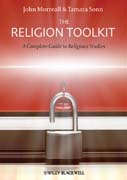
The religion toolkit: a complete guide to religious studies
Morreall, John
Sonn, Tamara
This complete overview of religious studies provides students with the essential knowledge and tools they need to explore and understand the nature of religion. Covers the early development of religion, with overviews of major and minor religions from Islam to Scientology Considers recent developments including secularization; the relationship between religion and science; and scientific studies on religion, health, and mystical experience Uses humor throughout, allowing students to remain open-minded to the subject Explains what it means to study religion academically, and considers the impact of the study of religion on religion itself Contains numerous student-friendly features including photos, maps, time lines, side bars, historical profiles, and population distribution figures Provides classroom users with a lively website including questions, quizzes, extra material, and helpful primary and secondary sources INDICE: 1. Introduction: Prepare To Be Surprised Part I: The Tools 2. An Overview of Religion: Making Sense of Life A. Explaining Suffering and Evil B. Explaining Death 1. Ghosts 2. Resurrection 3. Souls 4. Reincarnation C. The Importance of Order 1. Order Out of Chaos 2. Order and Predictability: Eschatology, Prophecy, Divination 3. Social Order a. Group Identity b.Ethics/Morality and Law c. Authority and Power D. The Role of Ritual E.Conclusion 3. The EarlyDevelopment of Religious Studies A. Philosophy, Theology, and Religious Studies 1. The Relationship between Philosophy and Theology 2. Two Kinds of Christian Theology B. Scriptural (Biblical) Studies and the Impact of the Printing Press 1. Baruch Spinoza William Robertson Smith: Historical Criticism C. The Rise of Modernity and New Academic Disciplines:Oriental Studies, Anthropology, Sociology, and Psychology 1. Max Müller: Oriental Studies and Religion 2. EdwardBurnett Tylor: Anthropology and Religion 3. James Frazer: Evolution and Religion D. Negative Views of Religion 1. Karl Marx: Religion and the Opiate of the Masses 2.Sigmund Freud: Religion and Neurosis E. Sociology of Religion 1. Emile Durkheim: Modernization Theory 2. Max Weber: The Protestant Ethic F. Conclusion 4. Religious Studies in the Twentieth Century A. Back to Philosophy 1. Analytic Philosophy: Antony Flew 2. Phenomenology and Religious Studies a. Rudolf Otto b. Mircea Eliade B. Philosophy of Religion 1. John Hick 2. William Lane Craig C. Anthropology of Religion 1. Clifford Geertz 2. Mary Douglas D. Sociology of Religion 1. Peter L. Berger 2. Robert N. Bellah E. Psychology of Religion 1. Wiliam James 2. Carl Jung F.Conclusion Part II: Using the Tools: Surveying World Religions 5. Early Traditions A. Prehistoric Traditions 1. Animism and Anthropomorphism 2. Death Rituals 3.Fertility Goddesses 4. Hunting Rituals 5. Shamans 6. Ancient Religions, Oral Religions B. The Neolithic Revolution, Patriarchy, and the Rise of Historic Religions C. Conclusion 6. The Family of Western Monotheisms: Jewish, Christian, and Islamic Traditions UNIT I: Judaism A. The Torah, the Hebrew Bible, the Old Testament B. The History and Teachings of Judaism 1. The First Five Centuries 2. The Middle Ages(500-1500CE) 3. The Modern Period (1750 to the present) a. The Enlightenment b.The Developmentof Reform Judaism c.Conservative Judaism d. Reconstructionist Judaism C. The Rituals of Judaism D. Judaism Today UNIT II: Christianity A. The History and Teachings of Christianity 1. Origins 2. The Development of Christian Doctrine a. The Institutionalization and Politicization of Christianity b. Eastern and Western Christians i. The Western/Roman Church ii The Eastern Orthodox Churches3. The Protestant Reformation B. Christian Rituals C. Christianity Today UNITIII: Islam A. The
- ISBN: 978-1-4051-8247-8
- Editorial: Wiley-Blackwell
- Encuadernacion: Cartoné
- Páginas: 368
- Fecha Publicación: 21/10/2011
- Nº Volúmenes: 1
- Idioma: Inglés
